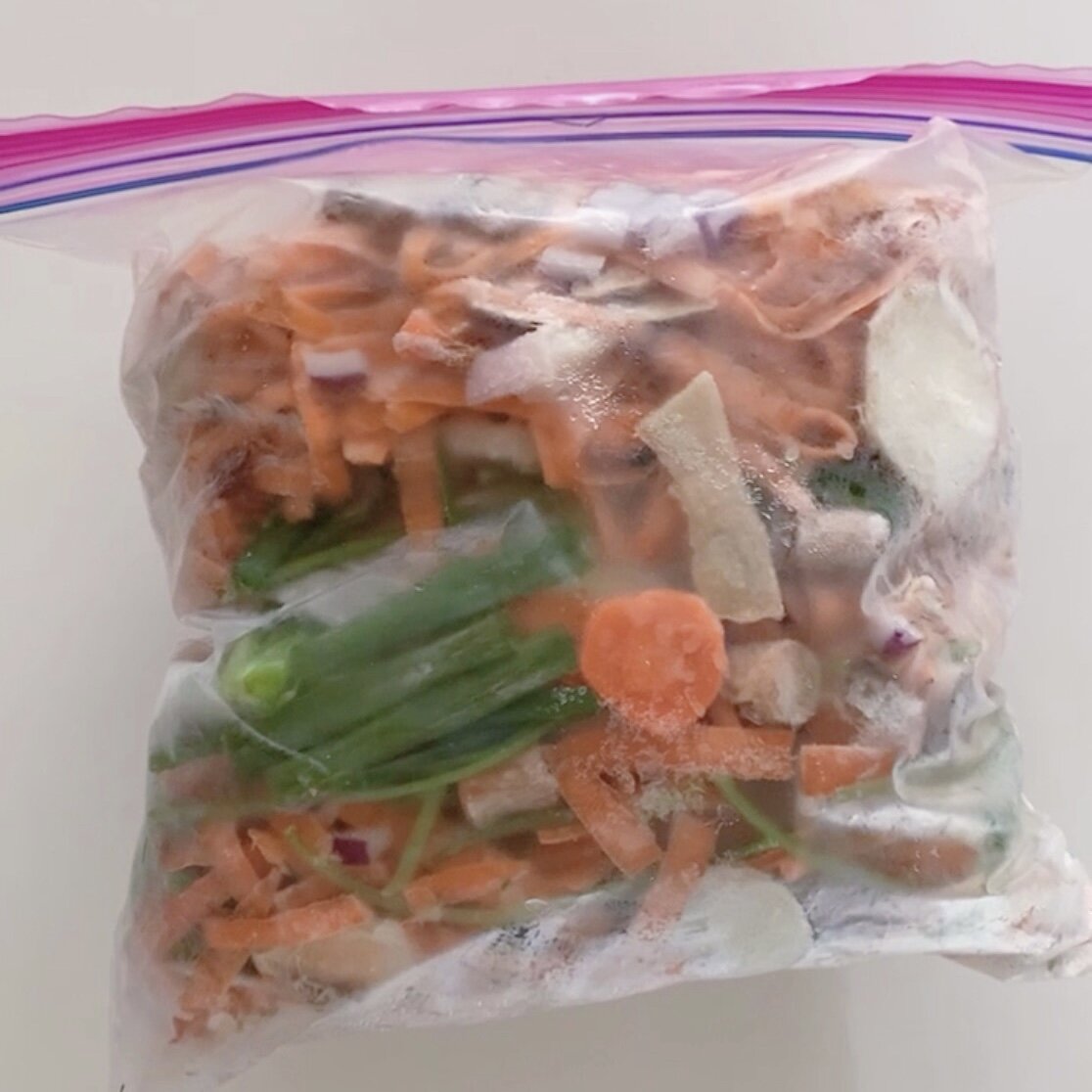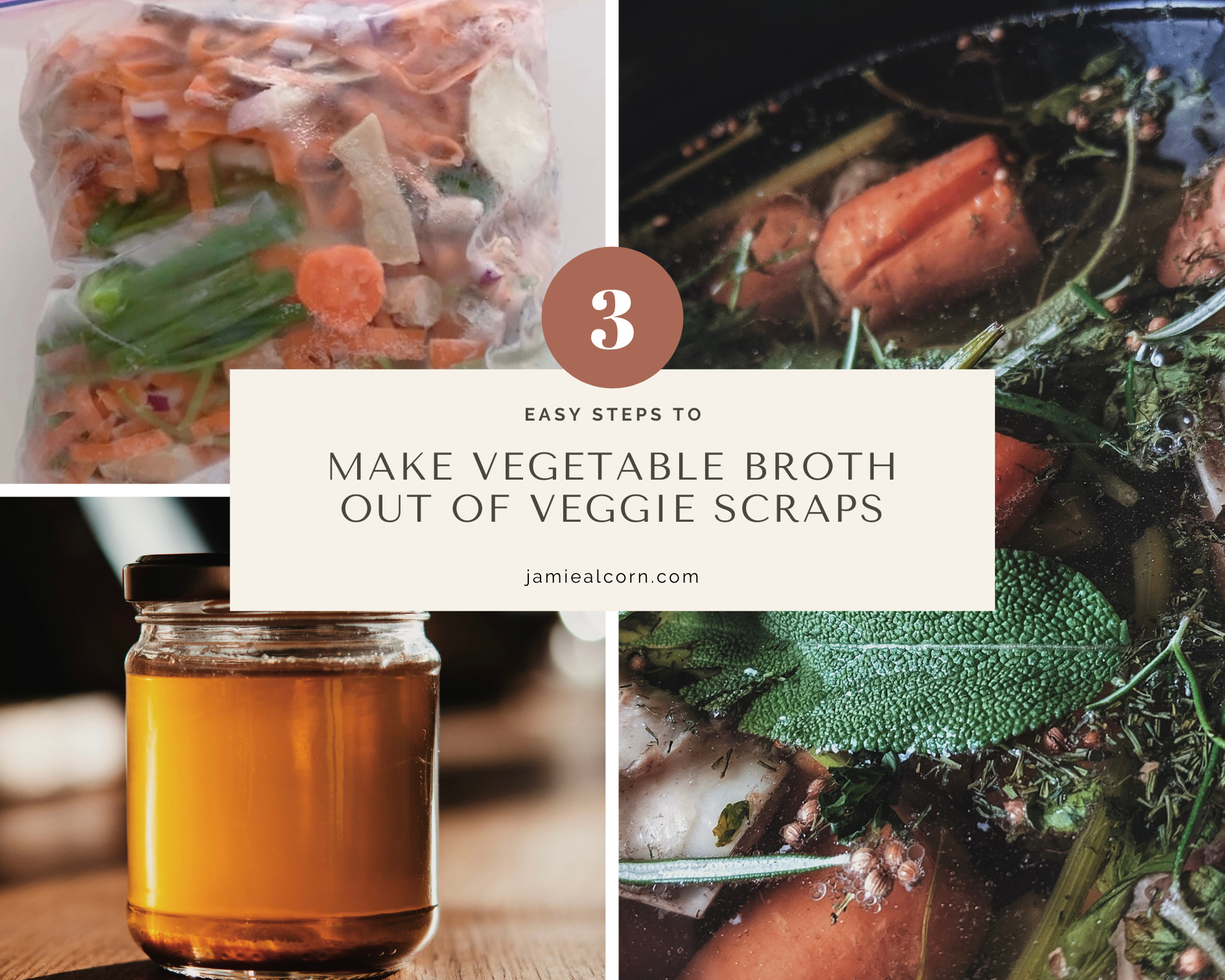How to Make Vegetable Broth Out of Veggie Scraps
Does a celery allergy sound like fake news to you?
It sure did for me the first time Nathan told me he was, in fact, allergic to celery. I started to take it more seriously though, as he described the anaphylactic shock and hospital visits he’d been through as a kid. And I really began to take it seriously when I started cooking for him, and realized celery is in everything—especially soup.
I’ll spare you the trouble of googling it: there is not a pre-maid, purchasable vegetable broth on the planet that does not contain celery. In order for me to ever enjoy the comforting simmer of a big pot of soup on the stove, I was going to have to get used to making everything—right down to the broth—from scratch. So for a while, I just didn’t make soup.
For years, making my own veggie broth felt like too much of a hassle, for two reasons:
Time. I barely have time to make the soup, let alone make a pre-soup. Doesn’t that feel like double work?
Waste. That’s what it felt like to to dump a batch of whole, fresh vegetables and herbs into a big pot of water just to boil the flavor out of them and throw them away.
But I finally cracked the code, and found a way to make vegetable broth that is both easy and quick, and reduces kitchen waste rather than adding to it. Please trust me when I say this method has completely transformed my experience in the kitchen. I went from feeling like I had few options, to unlimited options. And what’s more, I’m saving money and repurposing food scraps that would otherwise just go to waste. It’s a win-win for me, and it will be for you too.
How to Make Vegetable Broth Out of Veggie Scraps
3 Easy Steps:
1. Save your food scraps.
Keep a gallon-sized reusable ziplock bag in the freezer, and use it to store veggie scraps. Once the bag is full, you’re ready to make your broth!
2. Make your broth.
Empty the contents of your bag into a large stock pot, and add any fresh herbs or spices you have handy. Cover the the food scraps with water, and place pot on the stove. Bring to a boil, then reduce to a simmer for one hour.
3. Strain and store.
After an hour of simmering, remove pot from heat and strain all scraps from broth. Let broth cool completely, then transfer to freezer-safe jars and store in the freezer until you’re ready to use.
The Best Veggie Scraps to Save for Making Vegetable Broth
any veggies that may have gotten a bit sad and wilty in the fridge
carrot peels and small ends
sweet potato peels and small ends
celery ends and leaves (unless your husband has a celery allergy, of course :)
onion and shallot skins
green onion or leek ends
mushroom stems
small amounts of broccoli stems or kale stems
slightly wilted greens from fridge
extras to ADD FOR FLAVOR AND NUTRITIONAL VALUE:
fresh herbs like parsley, thyme, rosemary, cilantro
fresh garlic
fresh ginger
peppercorns
bay leaf
shiitake mushrooms
turmeric powder
HOW TO STORE VEGETABLE BROTH:
Use clean glass containers.
Refrigerate: Vegetable broth is good for up to a week in the fridge.
Freeze: Broth will last for up to 6 months in the freezer, but for best flavor, use within 2. I store in smaller portions of 2-3 cups. Be sure to leave room for expansion so as not to crack the glass.
What I’ve learned after making my own broth for so many years is that it’s pretty hard to mess things up. The pressure is off. Your broth will taste different every time, depending on what you put in it, but it’s nearly impossible to totally botch the batch. Mix it up! Add some extras for flavor and to boost nutrients.
The recipe below is just a place to start. Feel free to experiment. Have fun!
3 Easy Steps to Turn Your Veggie Scraps Into Vegetable Broth
INGREDIENTS
1 gallon-sized bag of vegetable scraps
1 carrots, roughly chopped
1 ribs of celery, roughly chopped
1/2 onion, roughly chopped
3 cloves of garlic, peeled
one inch piece of fresh ginger, peeled and sliced
1-2 bay leaves
a few sprigs of thyme or rosemary
a handful of parsley or cilantro
salt to taste (optional)
12–14 cups of clean water (enough to completely cover all vegetables)
make
Place everything in a large stock pot. Add water. Bring to a boil. Reduce heat and simmer for 1 hour.
Turn off heat. Using tongs or slotted spoon, remove solids. Then strain through a mesh sieve.
Store in fridge in airtight containers for up to a week. Or freeze in small portions and use later.



